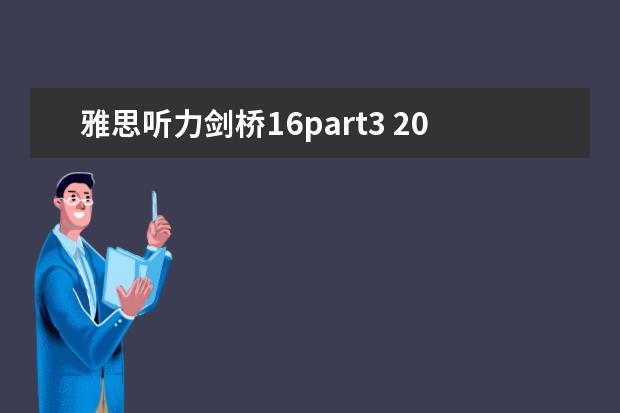今天雅思无忧小编为大家带来了留学雅思考试题 2023年6月29日雅思听力考试真题及答案,希望能帮助到大家,一起来看看吧!
本文目录一览:

2023年6月29日雅思听力考试真题及答案
您好,我是专注留学考试规划和留学咨询的小钟老师。在追寻留学梦想的路上,选择合适的学校和专业,准备相关考试,都可能让人感到迷茫和困扰。作为一名有经验的留学顾问,我在此为您提供全方位的专业咨询和指导。欢迎随时提问!
6月的最后一场雅思考试结束了,据说本场考试不简单哦,小钟老师整理了2023年6月29日雅思听力考试真题及答案,一起来看看都考到哪些题目吧。
Section1
主题:Enquiry on a Nursery 托儿所咨询
题型:填空题
难度:一般
参考答案:
1. Short days:$ 37. 50for children under two years old;
caring: offer20hours every week
dren can enjoy outdoor activities on aplayground
of the teachers have previously worked in aprimary school
nts will receive areporton a weekly basis
earliest month the two children can join isSeptember
s to bring:apron
ld also bring afamily photofor kids to avoid homesick
9.A medicalcertificatefrom a doctor is required
iopeAvenue
Section 2
主题:A Tourist Tower 天空塔旅游
题型:选择题+填空题
11. where should they meet after the tour?
C back of the entrance
12what can people see from the tower on a sunny day?
B. a hill
13 what do people think of the tower?
C landmark
14 what was the tower used to be?
B communication center
15-20 地图{版本1}
15 from theglasses ground, you can have a good view.
16 you can have meals and rest in the oor you can see anart gallery
17 there is apost, where you can send posters to family
18 there is aweather observingstation if you are interested in meteorology
19 the other one is a indoor platform
20 there is acinema,you can watch some exciting films
15-20 地图 {版本2}
15. from theglass floor
16. you can have your meals and rest in the restaurant. Outdoor you can see anart gallery
17-18. theweather informationand indoor restaurant
19. a post office because you can buy postcards and send to your families
20. acinema
Section 3
主题:Internship project discussion 老师与学生的讨论
题型:选择题+填空题
难度:稍难
参考答案:
21Bshe has contacted there
22 Bpeople are friendly to her
23Bthey have time to deal with relationships
24AFigure out the purpose of this intership
25 Speak to aformer workerwho have been here
26 talk to theprofessorabout problems
27 talk tochief executiveto get the feedback
28题干和答案缺失
29 if you have a bad mood, please contact thedepartment manager
30 talk thegroup organizer
Section4
主题:塑料的*工艺
题型:填空题
难度:中等
31 People usecottonand acid to produce plastic
32 Plastic is commonly found on products such as detergent bottles,milkjugs
33 It's used to produce artificialsilk.
34 Cellulose is not like real plastic because it becomeshardwhen heated
35 First plastic was invented in alaboratory
36 A chemist named Alexander Parkes developed it
37 Plastic can be produced by collecting recycledpens.
38 One disadvantage is that plastic produces gas when it's burnt, which could release toxic fumes also the manufacturing process results in large quantities of chemical pollutants
39 Research has shown that plastic decomposes by thelight
40 Naturalwoodno longer has a stranglehold on rubber products
希望以上的答复能对您的留学申请有所帮助。如果您有任何更详细的问题或需要进一步的协助,我强烈推荐您访问我们的留学官方网站
,在那里您可以找到更多专业的留学考试规划和留学资料以及*的咨询服务。祝您留学申请顺利!
2023年8月10日雅思口语考试真题及解析
您好,我是专注留学考试规划和留学咨询的小钟老师。在追寻留学梦想的路上,选择合适的学校和专业,准备相关考试,都可能让人感到迷茫和困扰。作为一名有经验的留学顾问,我在此为您提供全方位的专业咨询和指导。欢迎随时提问!
上周六完成了最新一期的雅思考试,那么大家对自己的考试分数有没有信心呢?和小钟老师来一起看看2023年8月10日雅思口语考试真题及解析。
一、真题
Part1题目汇总
The area you live in
Work or study
Hometown
weather
Transportation
Accommodation
Tea and coffee
Public holiday
Garbage
Perfume
Market
Borrowing
Social network
Outdoor
Math
Email
Pet
Smile
Plan
Crowded place
Music
Sharing
Visit relatives
Patience
Part2题目汇总
人物类:
Describe someone you would like to study or work with
Describe your favorite singer or band
Describe a person who often helps others
Describe an old person who is interesting
Describe someone you haven’t seen before but you would like to know more
Describe a person who has interesting ideas or opinions
Describe an intelligent person you know
Describe a child who made you laugh
Describe a foreign celebrity you want to meet in person
Describe a person who encouraged and helped you to achieve a goal
Describe a person you wanted to be similar to when you were growing up
Describe a person you have seen who is beautiful or handsome
物品类:
Describe a subject you used to dislike but now have interest in
Describe an advertisement you remember well
Describe an outdoor sport you played for the first time
Describe a healthy lifestyle you know
Describe a prize you want to win
Describe an item you bought but do not often use
Describe a piece of clothing you enjoy wearing
Describe the last book you read
Describe a kind of food people eat during a special event
Describe something lost by others but found by you
Describe your grandparent’s job
Describe a subject you used to dislike but now have interest in
Describe an interesting talk or lecture
Describe an activity you would do when you are alone in your free time
Describe a water sport you would like to try in the future
Describe a piece of good news you heard
Describe a historical period you would like to know
Describe a game show or a quiz program you watched on TV or online
Describe something special you took home from a tourist attraction
Describe a practical skill you learned
事件类:
Describe an experience that the vehicle you took broke down in your travel
Describe an unusual experience of travelling
Describe a time that you had to change your plan / your mind
Describe a time you solved a problem through the internet
Describe a time that you looked for information from the internet
Describe an important decision made with the help of other people
Describe a time that someone didn’t tell you the whole truth about something
Describe a time you enjoyed your free time
Describe a time you taught something new to a younger person
Describe a success your friend has achieved
Describe something you do to help you study or work
Describe a time you received horrible service
Describe an occasion when you got up early
Describe an occasion when you got incorrect information
Describe a time that you gave advice to others
Describe an experience that you received a call from someone you don’t know in the public place
Describe an experience that you went out with your friends and had a good time
Describe a time you borrowed something from your friends or family
Describe a situation when you didn’t have enough time
地点类:
Describe an ideal house
Describe a newly built public facility (such as parks, cinemas etc.) that influences your city
Describe a historical building you have been to
Describe a park/ garden you like visiting
Describe a place you plan to travel to that is far away from your home
二、名师点评
Part 1:
Study, hometown, accommodation依旧是同学们务必准备的三个话题。目前看来,话题依旧维持不变,但是像*ile,share,sky这类的题目对于大部分同学来说,确实有点难度。但是我们要以不变应万变,虽然题目乍一看挺难,但是稍微转化下题目,将没见过的题型转接到我们熟悉的题目上,问题就可以迎刃而解啦。
Part2:
Part2中,有部分题目属于乍一看很简单,仔细一想,却不知道如何具体细节展开去说,比如早起的经历,参加过的派对,邀请吃饭。所以这就需要我们同学在这些文字中加一些故事性,个性化的内容,不如一些“小冲突”,让事情不那么“自然地”发展下去。
希望以上的答复能对您的留学申请有所帮助。如果您有任何更详细的问题或需要进一步的协助,我强烈推荐您访问我们的留学官方网站
,在那里您可以找到更多专业的留学考试规划和留学资料以及*的咨询服务。祝您留学申请顺利!
请问2023年9月28日雅思阅读考试真题及答案
您好,我是专注留学考试规划和留学咨询的小钟老师。选择留学是人生重要的决策之一,而作为您的指导,我非常高兴能为您提供最准确的留学解答和规划。无论您的问题是关于考试准备、专业选择、申请流程还是学校信息,我都在这里为您解答。更多留学资讯和学校招生介绍,欢迎随时访问。
昨天刚刚结束了最新一期的雅思考试,大家有没有被难倒呢?接下来就跟着小钟老师来看一看2023年9月28日雅思阅读考试真题及答案。
Passage1: 希腊硬币Greek coinage
参考答案:
1. 希腊coin早在3000年就出现了=F
2. T
3. Sparta地区侵略Athens并强制Athens用他们的货币=F
4. Great coins在整个欧洲流传=F
5. Persian 入侵了Lydia并且使用人家的硬币=T
6. 用硬币上的头像来奖励做出杰出贡献的人=NG
7. mint
8. stamps
9. anvil
10. reserve dies
11. 希腊硬币的重量至少=0.15g
12. 硬币的图案=the king的头像
13. 希腊被波斯征服之前的花纹是lion and doil
14. coin 在雅典被称为 owl
Passage2: 悉尼交通标识Street markers in Sydney
Passage3: Musical Maladies
参考答案:
A. Music and the brain are both endlessly fascinating subjects, and as a neuroscientist specializing in auditory learning and memory, I find them especially intriguing. So I had high expectations of Musicophilia, the latest offering from neurologist and prolific author Oliver Sacks. And I confess to feeling a little guilty reporting that my reactions to the book are mixed.
B. Sacks himself is the best part of Musicophilia. He richly documents his own life in the book and reveals highly personal experiences. The photograph of him>C. The preface gives a good idea of what the book will deliver. In it Sacks explains that he wants to convey the insights gleaned from the enormous and rapidly growing body of work>complex and often bizarre disorders to which these are prone." He also stresses the importance of the simple art of observation" and the richness of the human context. He wants to combine observation and description with the latest in technology,” he says, and to imaginatively enter into the experience of his patients and subjects. The reader can see that Sacks, who has been practicing neurology for 40 years, is torn between the old-fashioned path of observation and the new-fangled, high-tech approach: He knows that he needs to take heed of the latter, but his heart lies with the former.
D. The book consists mainly of detailed descriptions of cases, most of them involving patients whom Sacks has seen in his practice. Brief discussions of contemporary neuroscientific reports are sprinkled liberally throughout the text. Part I, Haunted by Music," begins with the strange case of Tony Cicoria, a nonmusical, middle-aged surgeon who was consumed by a love of music after being hit by lightning. He suddenly began to crave listening to piano music, which he had never cared for in the past. He started to play the piano and then to compose music, which arose spontaneously in his mind in a torrent of notes. How could this happen? Was I the cause psychological? (He had had a near-death experience when the lightning struck him.) Or was it the direct result of a change in the auditory regions of his cerebral cortex? Electro-encephalography (EEG) showed his brain waves to be normal in the mid-1990s, just after his trauma and subsequent conversion to music. There are now more sensitive tests, but Cicoria has declined to undergo them; he does not want to delve into the causes of his musicality. What a shame!
E. Part II, “A Range of Musicality,” covers a wider variety of topics,but unfortunately, some of the chapters offer little or nothing that is new. For example, chapter 13, which is five pages long, merely notes that the blind often have better hearing than the sighted. The most interesting chapters are those that present the strangest cases. Chapter 8 is about “ amusia, ” an inability to hear sounds as music, and “dysharmonia,”a highly specific impairment of the ability to hear harmony, with the ability to understand melody left intact. Such specific dissociations are found throughout the cases Sacks recounts.
F. To Sacks's credit, part III, "Memory, Movement and Music," brings us into the underappreciated realm of music therapy. Chapter 16 explains how "melodic intonation therapy" is being used to help expressive aphasic patients (those unable to express their thoughts verbally following a stroke or other cerebral incident)>G. To readers who are unfamiliar with neuroscience and music behavior, Musicophilia may be something of a revelation. But the book will not satisfy those seeking the causes and implications of the phenomena Sacks describes. For>appears to be more at ease discussing patients than discussing experiments. And he tends to be rather uncritical in accepting scientific findings and theories.
H. It's true that the causes of music-brain oddities remain poorly understood. However, Sacks could have done more to draw out some of the implications of the careful observations that he and other neurologists have made and of the treatments that have been successful. For example, he might have noted that the many specific dissociations among components of music comprehension, such as loss of the ability to perceive harmony but not melody, indicate that there is no music center in the brain. Because many people who read the book are likely to believe in the brain localization of all mental functions, this was a missed educational opportunity.
I. Another conclusion>patient. Treatments mentioned seem to be almost exclusively antiepileptic medications, which "damp down" the excitability of the brain in general; their effectiveness varies widely.
J. Finally, in many of the cases described here the patient with music-brain symptoms is reported to have "normal" EEG results. Although Sacks recognizes the existence of new technologies, among them far more sensitive ways to *yze brain waves than the standard neurological EEG test, he does not call for their use. In fact, although he exhibits the greatest compassion for patients, he conveys no sense of urgency about the pursuit of new avenues in the diagnosis and treatment of music-brain disorders. This absence echoes the book's preface, in which Sacks expresses fear that the simple art of observation may be lost" if we rely too much on new technologies. He does call for both approaches, though, and we can only hope that the neurological community will respond.
27-30:B C A A
31-36:YES NG NO NG YES NO
37-40:F B A D
以上信息希望能帮助您在留学申请的道路上少走弯路。如果您还有更多问题或需要深入探讨,不要犹豫,您可以在我们的留学官方网站上找到更丰富的考试资讯、留学指导和*专家咨询服务。我们的团队始终站在您的角度,为您的留学梦想全力以赴。祝您申请顺利!
以上就是雅思无忧整理的留学雅思考试题 2023年6月29日雅思听力考试真题及答案相关内容,想要了解更多信息,敬请查阅雅思无忧。
雅思培训
免责声明:文章内容来自网络,如有侵权请及时联系删除。


 剑桥雅思听力动画情景模拟 2023年4月雅思考试听力真题机经(4月29日)
剑桥雅思听力动画情景模拟 2023年4月雅思考试听力真题机经(4月29日)
 雅思听力剑桥16part3 2023年4月雅思考试听力真题机经(4月29日)
雅思听力剑桥16part3 2023年4月雅思考试听力真题机经(4月29日)
 剑桥雅思5听力原文ward 请问2023年5月29日雅思听力考试真题与答案
剑桥雅思5听力原文ward 请问2023年5月29日雅思听力考试真题与答案
 剑桥雅思听力真题text1 2023年4月雅思考试听力真题机经(4月29日)
剑桥雅思听力真题text1 2023年4月雅思考试听力真题机经(4月29日)
 剑桥雅思听力8test2题目 请问2023年5月29日雅思听力考试真题与答案
剑桥雅思听力8test2题目 请问2023年5月29日雅思听力考试真题与答案
 剑桥雅思听力真题s11 2023年4月雅思考试听力真题机经(4月29日)
剑桥雅思听力真题s11 2023年4月雅思考试听力真题机经(4月29日)
 剑桥雅思听力真题 test2 请问2023年5月29日雅思听力考试真题与答案
剑桥雅思听力真题 test2 请问2023年5月29日雅思听力考试真题与答案
 剑桥雅思听力11test2原文 请问2023年5月29日雅思听力考试真题与答案
剑桥雅思听力11test2原文 请问2023年5月29日雅思听力考试真题与答案
 雅思剑桥真题c6答案听力 2023年6月29日雅思听力考试真题及答案
雅思剑桥真题c6答案听力 2023年6月29日雅思听力考试真题及答案
 剑桥雅思6text3听力 2023年6月29日雅思听力考试真题及答案
剑桥雅思6text3听力 2023年6月29日雅思听力考试真题及答案